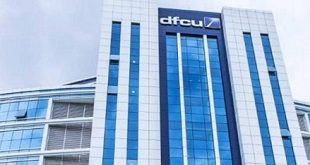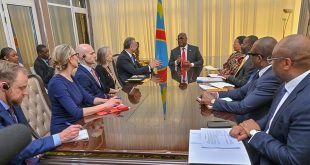
By Eriasa Mukiibi Sserunjogi
Ssemogerere offers advice but party’s troubles are bigger than just removing Mao
Standing at the headquarters of the Democratic Party at City House, Second Floor, it is difficult to imagine why controlling Uganda’s oldest political party is a do-or-die job for some people.
A few meters away from the entrance to the party’s offices, women are doing brisk business vending food prepared in what used to be places of convenience. At a strategic corner to the lower side is a small inn which is part of the reason the building is crowded with sex workers shortly after sunset.
On the dusty First Floor, there is a string of stationary shops and secretarial bureaus, which policemen habitually raid on suspicion of forging academic and other documents like driving permits. Traders here live in perpetual fear that the owner of the building has kept it in a state of disrepair because he aims to pull it down anytime.

The DP offices look better than the adjacent ones, thanks to a coat of white and green paint and interior refurbishing done by the Norbert Mao administration to announce the arrival of a ‘new dawn’. But the inhabitants of the offices know they are there because of the generosity of the landlord who has not collected rent in decades.
The party desperately needs to find money to take care of its operations, build its own headquarters and reinvigorate its support base and court new members to challenge for power. This was the wave that Mao rode to the party leadership in the February 2010 Delegates’ Conference in Mbale.
A section of the new generation of the party’s membership felt Mao, given his eloquence and record as MP and chairman of Gulu district, would correct the mistakes of the older generation. The older generation had been blamed for reducing the party to an ineffective Catholic-Baganda outfit that was incapable of assuming a national character and take power.
In the lead-up to Mbale, many DP members were willing to overlook the legal and political roadblocks the party faced to usher in the ‘messiah’. Mao’s unofficial name was ‘Obama’, in reference to the relative political novice (Barack Obama) who took America by storm to become president in 2008.
Haunted history
But DP’s political and legal troubles are back with a vengeance.
A recent court order has been halted but had it been implemented, DP would have no leadership, MP or local council leader until fresh elections are held. The order, issued Feb. 28 by High Court Registrar Isaac Muwaata, required Mao, his executive members and elected politicians who stood for parliament and local government elections on the DP ticket to be removed from office.
The order stemmed from an October 2009 ruling by Judge Yokoram Bamwine that nullified the election of Mathias Nsubuga as secretary general after the resignation of Prof. Ebil Otto. In a DP National Council meeting chaired by former party President Ssebaana Kizito on August 1, 2008, Nsubuga defeated then Deputy Secretary General Lulume Bayigga but the election was later successfully challenged in court.
The six petitioners, believed to have been at least initially sponsored by Buikwe MP Bayigga, challenged the procedure of the meeting, specifically that the meeting was chaired by President Ssebaana instead of the National Chairman. Ssebaana had fallen out with Chairman Prof. Joseph Mukiibi. The petitioners – Peter Ochieng, Gerald Kobwemi, John Tusiime, Paul Luyombya, Hussein Lubega and Noelina Namugenyi – also argued that some of those who voted for Nsubuga were not genuine members of the National Council.
The Ssebaana-Nsubuga faction filed a Notice of Appeal in the High Court that they never followed up and was eventually struck down last year. They had done so ostensibly to bide time and go through with the planned Mbale Delegates Conference and later argue that the Bamwine ruling had been “overtaken by events”.
The Ssebaana-Nsubuga faction pressed on with going to Mbale and argued that they had entered a consent judgment with former DP stalwart Nasser Ssebaggala to hold the Mbale Delegates Conference as scheduled. They rebuffed a string of legal challenges and pleas for first pursuing reconciliation to go through with the Mbale process citing the consent judgment.
Kawanga Ssemwogerere, another former DP president, was on the forefront of pursuing the reconciliation angle to take a united party to Mbale. But Ssemwogerere’s advice was not received with favour at the DP headquarters, where a group accused him of weakening the party – first by allying with Museveni in 1986 and later with Besigye in the 2001presidential election. They demanded a different leadership and approach.
Ssebaana, who had fallen out with his former boss Ssemwogerere, prevaricated over reconciliation and pushing on with Mbale. Cardinal Emmanuel Wamala and constitutional lawyer Prof. Fredrick Ssempebwa, according to accounts by different people who participated in the process, were also ‘deeply’ involved in trying to broker an understanding.
But Norbert Mao, then-chairman of Gulu district and hopeful of taking over the leadership of DP as a launch pad to compete in the fast-advancing February 2011 presidential elections, was running out of time. He wanted the delegates conference to be held quickly to prepare for the presidential campaigns.
Sources say Ssebaana, in courting Mao, could have wanted to hand over power to somebody disagreeable to some members of the old-guard if only to settle old scores. Ssebaana, being Anglican, was himself an outsider going by the primordial understanding of some DP supporters who expected DP leaders to be Baganda and Catholic. Mao emerged as a suitable candidate, after all it is understood he had earlier entered a gentleman’s agreement with Ssebaana.
When Ssebaana defeated Mao in the Namboole race to replace Ssemwogerere in 2005, Mao dismissed the DP leadership as tribal and he appeared set to quit the party. But Ssebaana courted him, ostensibly with a promise to return the favour at a later date, and Mao became Ssebaana’s campaign manager for the 2006 presidential elections. Mbale seemed the perfect opportunity to return the compliment.
Post-Mbale
Mao pushed for Mbale with gusto. After being nominated to compete for the DP presidency, Mao frowned at the idea of pursuing reconciliation before Mbale, saying it was a “long process” with which they would continue after Mbale. In his inaugural speech after Mbale, the new DP president said they would pursue reconciliation with those who wanted it, but “reconciliation will not be our preoccupation”.
Mao’s post-Mbale message was realistic and he seemed aware of the frustration he would be visited on. A faction led by Samuel Lubega, who was also eyeing the DP and national presidency, had boycotted the Mbale conference, just like party strongman Erias Lukwago and then-Mukono North MP Betty Nambooze. Lubega would later run for president as an independent candidate, the same platform on which Lukwago successfully challenged for the Kampala lord mayor job.
Apart from the support of the Ssebaana-Nsubuga group with which Mao went to Mbale, he had a beatable opponent. Nasser Ssebaggala was thought to have the money to possibly bribe delegates, but Mao also knew his challenger’s record as Kampala mayor was viewed disdainfully by many DP supporters. Ssebaggala was also accused of working with President Yoweri Museveni to weaken DP.
But managing DP has proved more difficult for Mao than it was for him to take over the leadership of the party. As DP president, Mao’s leadership had to endorse parliamentary candidates, notably Betty Nambooze, who backed FDC’s Kizza Besigye in a presidential election in which their party president was running. Lukwago declined to seek anointing from DP for the lord mayor election, saying he didn’t know from which faction – whether Mao’s or Lubega’s – he would seek endorsement.
After an acrimonious process through which they came to power, Mao says they have “bent over backwards to reconcile the party (and) a large number of those who boycotted Mbale accepted us”.
But not every DP member thinks so. Ochieng, one of the petitioners against Mao’s leadership, says they do not trust Mao’s reconciliation talk. For them to be sure that Mao is serious, says Ochieng, “Let them first leave party leadership and we talk”.
Ochieng, who was in Judge Eldard Mwanguhya’s chambers with members of Mao’s group on Mar. 7 when the judge urged the two sides to negotiate out of court, says the ideal approach would entail establishing an interim leadership for say three months that would organise fresh elections within the party.
Mwanguhya, on Mar. 9, advised both parties to pursue reconciliation, arguing that political parties resolve their issues politically, not in courts. But Ochieng says even after Mwanguhya recalled the order that would have evicted Mao, his executive and the party’s elected members, they will continue with litigation until “justice is done”.
Towards the end of last year, Ochieng and group filed a petition in the Constitutional Court through Dr. James Akampumuza still seeking to throw out Mao and other DP leaders. The petition is pending disposal.
Mao says he is prepared for the long haul: “Whatever the outcome as far as the law goes we believe that we stand on firm ground and we are determined to stress the legitimacy of our case up to the Supreme Court.”
But Ssebaana is impatient. “What have they (Ochieng and group) done for DP?” Ssebaana wonders, adding that the solution is to expel the petitioners from the party.
“There is no room for reconciling with them, all they deserve is to be dismissed (from the party),” said Ssebaana, adding, “They are free to start a party of their own.”
Ochieng’s group say Lubega is the true DP president, having been elected in a parallel delegates conference convened after Mbale. Lubega could not be reached for comment because he is away in London but when this reporter talked to him shortly after the Court of Appeal struck out Nsubuga’s Notice of Appeal last year, he was in jubilant mood and “ready to take office”.
Former party President Ssemwogerere could not be drawn into discussing the current happenings in DP, but instead went philosophical and restricted himself to generics. “Is that (wrangling and confusion) only happening to DP?” Ssemwogerere asked, adding, “Just investigate what is disturbing all our parties”.
In a tone devoid of enthusiasm, Ssemogerere said he can offer his opinion to individual DP leaders if they approached him, although the “decisions remain theirs”.
The bug of disinterest in what happens to DP under Mao also afflicts Lord Mayor Lukwago. Lukwago declined to comment on the current gridlock within DP, saying he would rather concentrate on his responsibilities as lord mayor.
But observers say, with the backing of party members like MPs Nambooze, Medard Sseggona and Mathias Mpuuga, Lukwago is lurking in the corridors in case a power vacuum occurs in DP.
With no money, loyalty from the majority of DP MPs and a sizeable membership especially of the old-guard in DP, Mao seems to be living on borrowed time. He is likely to hang on to the party’s leadership by a legal thread because even if he is to be removed the legal struggle can still be protracted.
But even if Mao quits or is removed, DP’s problems seem poised to linger for longer. Ochieng and group also have a moral question on which to reflect: Does their attempt to correct whatever legal or political wrongs could have been committed in the past justify dragging their own party’s MPs and local councillors out of office? Even MP Bayigga, their supposed sponsor in the first place, would have problems agreeing with them.
 The Independent Uganda: You get the Truth we Pay the Price
The Independent Uganda: You get the Truth we Pay the Price



